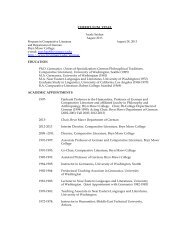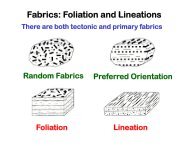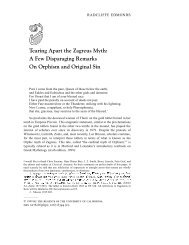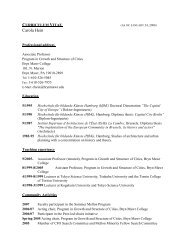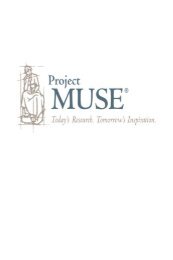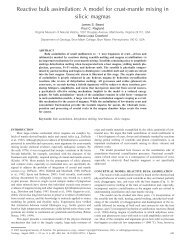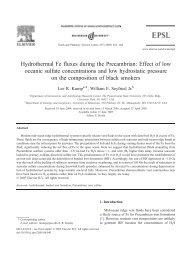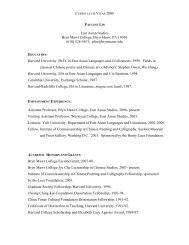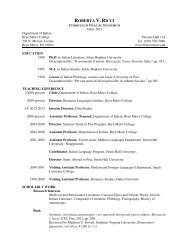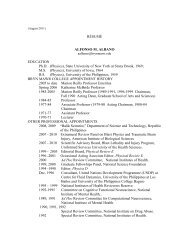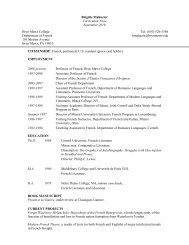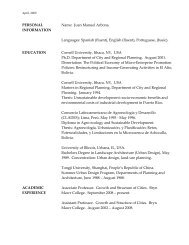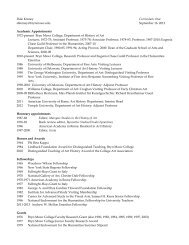- Page 1 and 2:
The Judgment of Animals in Classica
- Page 3 and 4:
the meaning of the term zw|~on—us
- Page 5 and 6:
Table of Contents Acknowledgments .
- Page 7 and 8:
Section 2 a. Dogs Stealing and Gobb
- Page 9 and 10:
Acknowledgements First and foremost
- Page 11 and 12:
Introduction It is generally though
- Page 13 and 14:
of their art while maintaining awar
- Page 15 and 16:
connection between animals and life
- Page 17 and 18:
Chapter three, “The Classical Gre
- Page 19 and 20:
turn, shaped by contemporary ideas
- Page 21 and 22:
with the animal kingdom. 5 Regardin
- Page 23 and 24:
The examples just cited show that r
- Page 25 and 26:
studying freestanding statues of li
- Page 27 and 28:
particular, has dominated twentieth
- Page 29 and 30:
Regarding classical antiquity, the
- Page 31 and 32:
their grip, for a “tooth” on ea
- Page 33 and 34:
discussion of the sculpture to whic
- Page 35 and 36:
them. Consequently the Athenians wi
- Page 37 and 38:
subjects on the basis of which arti
- Page 39 and 40:
of the later (Hellenistic) developm
- Page 41 and 42:
The theory that naturalism played t
- Page 43 and 44:
we have seen or sensed in the past,
- Page 45 and 46:
valued criterion of judging works o
- Page 47 and 48:
more accurate observation and rende
- Page 49 and 50:
judged by the ancient Greeks? As su
- Page 51 and 52:
is still central to his argument, b
- Page 53 and 54:
wars, the symmetry of their tense p
- Page 55 and 56:
Archaic and Classical phases, follo
- Page 57 and 58:
the acquired skill of craftsmanship
- Page 59 and 60:
prevalence of naturalism in his vie
- Page 61 and 62:
The statement shows clearly that Bo
- Page 63 and 64:
of Kollytos in the Athenian Keramei
- Page 65 and 66:
Having expressed this idea, he pres
- Page 67 and 68:
5. Not Naturalism and Realism. The
- Page 69 and 70:
animals, but rather highlights thei
- Page 71 and 72:
instead of a message highlights the
- Page 73 and 74:
quality of Cleiton’s statues, or,
- Page 75 and 76:
valuable guide to the ancient inter
- Page 77 and 78:
importance of these notions in defi
- Page 79 and 80:
made of bronze, if Myron had worked
- Page 81 and 82:
first century A.D., the statue pres
- Page 83 and 84:
lifelikeness of the statue, in quit
- Page 85 and 86:
Wilt thou not lead me into the hous
- Page 87 and 88:
a real animal might act in the real
- Page 89 and 90:
The fourth epigram, an anonymous, a
- Page 91 and 92:
In the fourth epigram, also an anon
- Page 93 and 94:
mistaken a bronze cow for a real on
- Page 95 and 96:
The statue proclaims its lifelikene
- Page 97 and 98:
and the man leading it, and the wom
- Page 99 and 100:
orrowed voice, the boundary between
- Page 101 and 102:
oundary between lifeless art and re
- Page 103 and 104:
had made a success of that as well,
- Page 105 and 106:
eference to the error of the Pliny
- Page 107 and 108:
form of equine connoisseurship resp
- Page 109 and 110:
Chapter 2: Representations of Anima
- Page 111 and 112:
markers of both sexes.” 138 He ca
- Page 113 and 114:
little in the way of explanation. I
- Page 115 and 116:
een noted, a confluence of three di
- Page 117 and 118:
The Possibility of Influence from B
- Page 119 and 120:
“in the later fifth and fourth ce
- Page 121 and 122: speaking of the style of Classical
- Page 123 and 124: It is perhaps Xenophon’s use of t
- Page 125 and 126: William Brown suggests that this pa
- Page 127 and 128: the expense of realism, or to a com
- Page 129 and 130: B.C. 178 Although not described in
- Page 131 and 132: inconsistent style. That of Vermeul
- Page 133 and 134: and degrees in which this combinati
- Page 135 and 136: 2. Two Cases Studies: The Lion and
- Page 137 and 138: just as odd a man and the beast doe
- Page 139 and 140: The Motif of the Lion Holding the H
- Page 141 and 142: ehavior, the description of Hector
- Page 143 and 144: Despite its unclear authorship and
- Page 145 and 146: animals and have the softest hair;
- Page 147 and 148: with it. He provides this descripti
- Page 149 and 150: Further, Willemsen’s observation
- Page 151 and 152: The body of the Kerameikos hound ap
- Page 153 and 154: that the author of the Physiognomic
- Page 155 and 156: Those [animals] who have thin lips
- Page 157 and 158: knowledge of the dog mating with ot
- Page 159 and 160: serve their arrangement in Classica
- Page 161 and 162: Chapter 3: The Classical Greek Cont
- Page 163 and 164: SECTION 1 a. Dogs Living in the Hou
- Page 165 and 166: eferring first to the human family
- Page 167 and 168: Aristotle’s Politics, so pervasiv
- Page 169 and 170: that of a dog: his location on the
- Page 171: In contrast to this suggestion, Joh
- Page 175 and 176: thing is possible then,” said I,
- Page 177 and 178: If anyone’s out of bread but has
- Page 179 and 180: c. Molossian Dogs as Guardians of t
- Page 181 and 182: incident, Aegeas was a ferocious Mo
- Page 183 and 184: Aristotle indicates that Molossian
- Page 185 and 186: untrustworthy animal. So pervasive
- Page 187 and 188: the dog’s stealing of food within
- Page 189 and 190: mythological dogs, such as those of
- Page 191 and 192: Cleon of embezzling money while cam
- Page 193 and 194: Although not provoked by the act of
- Page 195 and 196: Apart from labeling dogs as indiscr
- Page 197 and 198: 190 B.C.), and cited in Athenaeus
- Page 199 and 200: Detienne and Vernant that wisdom an
- Page 201 and 202: egarding mh~tij, the canine behavio
- Page 203 and 204: e. The Savage Nature of Dogs Histor
- Page 205 and 206: The textual evidence discussed in t
- Page 207 and 208: efers to some countries as consumer
- Page 209 and 210: living together with humans brings
- Page 211 and 212: example, states that “these lines
- Page 213 and 214: and thus poor men. 317 On the basis
- Page 215 and 216: with dog flesh. 322 Further, on the
- Page 217 and 218: flesh as medicinal food notwithstan
- Page 219 and 220: ordinary food, but is not connected
- Page 221 and 222: 2. Disease of the Back Similar to t
- Page 223 and 224:
ensured only if one is willing to
- Page 225 and 226:
The literary evidence contained in
- Page 227 and 228:
practice of eating dog meat indicat
- Page 229 and 230:
product of an artistic process,”
- Page 231 and 232:
Georgopapadakos. 344 On the basis o
- Page 233 and 234:
that is Friendship. They made her k
- Page 235 and 236:
assume that they referred to images
- Page 237 and 238:
the meaning of zw|~on in the fifth
- Page 239 and 240:
tendency not to distinguish between
- Page 241 and 242:
zw|~a. Thus, they translate the fir
- Page 243 and 244:
econstructed as five consecutive fr
- Page 245 and 246:
To conclude the discussing of Herod
- Page 247 and 248:
Turning to zw|~a, one sees that Her
- Page 249 and 250:
With regard to the modern definitio
- Page 251 and 252:
Regarding modern translations of zw
- Page 253 and 254:
length of the causeway was 5 sta&di
- Page 255 and 256:
The fragment was initially assigned
- Page 257 and 258:
estates, whereas the middle part wo
- Page 259 and 260:
of sand and limestone chips. The po
- Page 261 and 262:
limestone mantle. 441 Its poor cond
- Page 263 and 264:
Undoubtedly, these zw|~a did show s
- Page 265 and 266:
statement accords well with the pro
- Page 267 and 268:
pyramid in Egypt. Tu&pon is the acc
- Page 269 and 270:
Herodotus provides further insight
- Page 271 and 272:
evidence should be also added an Ar
- Page 273 and 274:
g. The Zw|~a of Mandrocles’ Paint
- Page 275 and 276:
The passage is instructive for the
- Page 277 and 278:
the representations of enthroned Da
- Page 279 and 280:
Herodotus gives no details about th
- Page 281 and 282:
Grene, who says “little figures.
- Page 283 and 284:
theory has dominated scholarship. 5
- Page 285 and 286:
iders on horses that gallop to the
- Page 287 and 288:
inscription is in the form of a hea
- Page 289 and 290:
The existing blocks that form the b
- Page 291 and 292:
suggests a distinctive technique of
- Page 293 and 294:
The same type of information is rec
- Page 295 and 296:
addition, the inscriptions provide
- Page 297 and 298:
stone and zw~ia suggests a standard
- Page 299 and 300:
description for something, and ther
- Page 301 and 302:
Erechtheion, and also fragments of
- Page 303 and 304:
uilding, and also marked a technica
- Page 305 and 306:
Socrates likens the use of colors b
- Page 307 and 308:
on a surface produced by painting,
- Page 309 and 310:
outstanding allotment of happiness
- Page 311 and 312:
indicates that it was a term of gen
- Page 313 and 314:
government of the state. Four perso
- Page 315 and 316:
form a group of discussants on the
- Page 317 and 318:
prominently in Plato’s discussion
- Page 319 and 320:
“animals,” and Pangle, as “li
- Page 321 and 322:
general. Trevor Saunders attempts t
- Page 323 and 324:
And I do not think it is right that
- Page 325 and 326:
contrasted to the representations o
- Page 327 and 328:
Aristotle likens the formation of t
- Page 329 and 330:
paintings—also connected with zw&
- Page 331 and 332:
The third occurrence of the term in
- Page 333 and 334:
kaq' au(to_ ei]nai…qew&rhma), and
- Page 335 and 336:
temple.” Now the statue [a1galma]
- Page 337 and 338:
of real bodies. When this meaning i
- Page 339 and 340:
Conclusions Animals are fundamental
- Page 341 and 342:
animals—as essential elements of
- Page 343 and 344:
scholarly interpretations of the pr
- Page 345 and 346:
The literary, epigraphical, and scu
- Page 347 and 348:
APPENDIX: TESTIMONIA Note to the re
- Page 349 and 350:
Eu)po&lidi tw|~ th~j kwmw|di/aj poi
- Page 351 and 352:
with no seal broken in the length o
- Page 353 and 354:
ku&nej de\ e0cai/fnhj oi0kouroi\ pe
- Page 355 and 356:
17 Anonymous, Anthologia Palatina 9
- Page 357 and 358:
26 Anonymous, Anthologia Palatina 9
- Page 359 and 360:
33 Antipater of Sidon, Anthologia P
- Page 361 and 362:
watches, and when you happen to gap
- Page 363 and 364:
ou)de\n ga_r e1rgon h}n a1r' a)qliw
- Page 365 and 366:
835 ba&ll' e0j ko&rakaj. toioutoni\
- Page 367 and 368:
Prw~ton me\n ou}n to_ a1nw ku&toj a
- Page 369 and 370:
xai/rousin a)lla_ th|~ brw&sei, th_
- Page 371 and 372:
In Phasis there is a breed of small
- Page 373 and 374:
Text and translation: D. M. Balme,
- Page 375 and 376:
ou)de\n de\ oi[on eu)nh_ malqakh_ k
- Page 377 and 378:
e1ti de\ kai\ eu)w&desi ta_j xei=ra
- Page 379 and 380:
μέν[a έν f]ρo[uρ ί k ]do[ς
- Page 381 and 382:
λίθος πρὸς ℎο̑ι τ
- Page 383 and 384:
the horse and the man appearing beh
- Page 385 and 386:
As for dogs, what can I say? In som
- Page 387 and 388:
Tou&twn te w}n ei3neken oi9 Lakedai
- Page 389 and 390:
Herodotus 2.148 oi9 ga_r e0pestew~t
- Page 391 and 392:
asile/a te Darei=on e0n proedri/h|
- Page 393 and 394:
110 Hippocrates, De affectionibus i
- Page 395 and 396:
Hippocrates, De morbis ii 44.16-44.
- Page 397 and 398:
Rub well silphium equal to one grai
- Page 399 and 400:
that on the peaks of a mountain fig
- Page 401 and 402:
Text and translation: W. R. Paton,
- Page 403 and 404:
a)festhko&j. e0ntau~qa e9kate/ra mo
- Page 405 and 406:
Text and translation: W. R. Paton,
- Page 407 and 408:
The accounts given by all us must b
- Page 409 and 410:
a1frona gegone/nai nomoqe/thn, w3st
- Page 411 and 412:
The eyes, the most beautiful featur
- Page 413 and 414:
153 Pliny 34.72 A.D. I Text and tra
- Page 415 and 416:
Another habit of his was when he ha
- Page 417 and 418:
for the earth-goddess Hecate, it ha
- Page 419 and 420:
dia_ pollw~n de\ o( Qeo&frastoj e0k
- Page 421 and 422:
The characteristics of the brave ma
- Page 423 and 424:
oi[j ta_ xei/lh lepta_ kai\ e0p' a1
- Page 425 and 426:
185 Sophocles, Antigone 198-206 V B
- Page 427 and 428:
the taste will make them less incli
- Page 429 and 430:
“Cleiton, that your statues of ru
- Page 431 and 432:
B. Arntsen, Dog On The Roof…No La
- Page 433 and 434:
_____, Early Greek Vase Painting. 1
- Page 435 and 436:
A. Campana, “The Origin of the Wo
- Page 437 and 438:
_____, “The Greek Images of the G
- Page 439 and 440:
E. Fudge, “A Left-Handed Blow: Wr
- Page 441 and 442:
M. Haase, Eine Stätte für die Ewi
- Page 443 and 444:
W. W. How and J. Wells, A Commentar
- Page 445 and 446:
R. G. Kent, Old Persian. Grammar. T
- Page 447 and 448:
A. Linzey and T. Regan, eds., Anima
- Page 449 and 450:
H. W. Miller, “Aristophanes and M
- Page 451 and 452:
_____, “Cario and the New World o
- Page 453 and 454:
S. B. Pomeroy, Xenophon. Oeconomicu
- Page 455 and 456:
C. Rolley, La tombe princière de V
- Page 457 and 458:
W. Smith, ed., Dictionary of Greek
- Page 459 and 460:
C. Thorne, “Feeding Behavior of D
- Page 461 and 462:
S. Simpson, eds., Pictorial Narrati
- Page 463 and 464:
Young, Archaic Marble Sculpture fro
- Page 465 and 466:
Fig. 1 Classical statue of a dog fr
- Page 467 and 468:
Fig. 4 Classical Inscription from a
- Page 469 and 470:
Fig. 7 Classical statue of a lion f
- Page 471 and 472:
Fig. 10 The lion of Amphipolis (fou
- Page 473 and 474:
Fig. 13 Late Geometric II stand fro
- Page 475 and 476:
Fig. 16 Late Archaic Boeotian terra
- Page 477 and 478:
Fig. 21 Reconstruction of part of a
- Page 479 and 480:
Fig. 24 Capstone of the pyramid of
- Page 481 and 482:
Fig. 26 Archaic bronze krater from
- Page 483:
Fig. 29 Figure of a horrified femal




